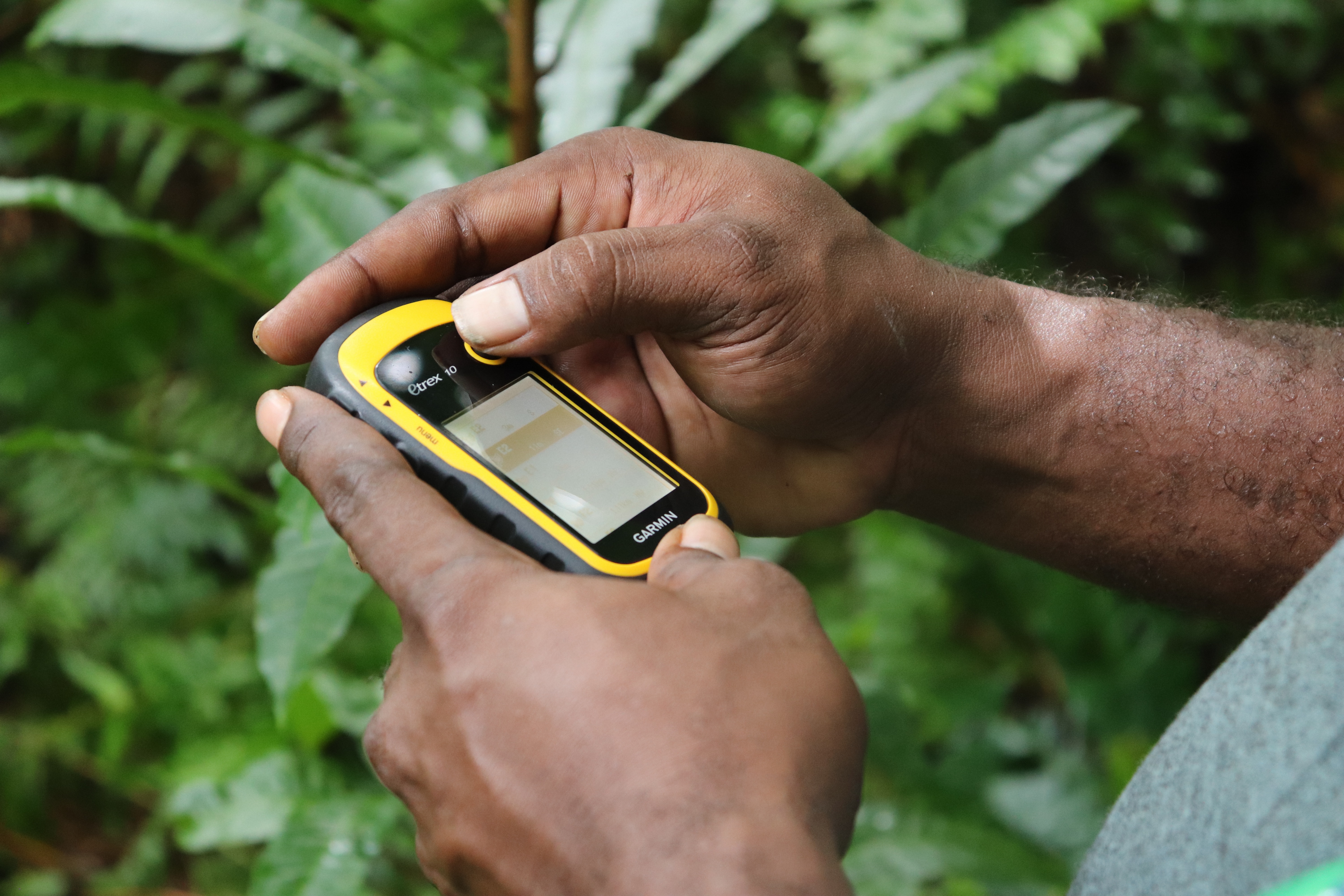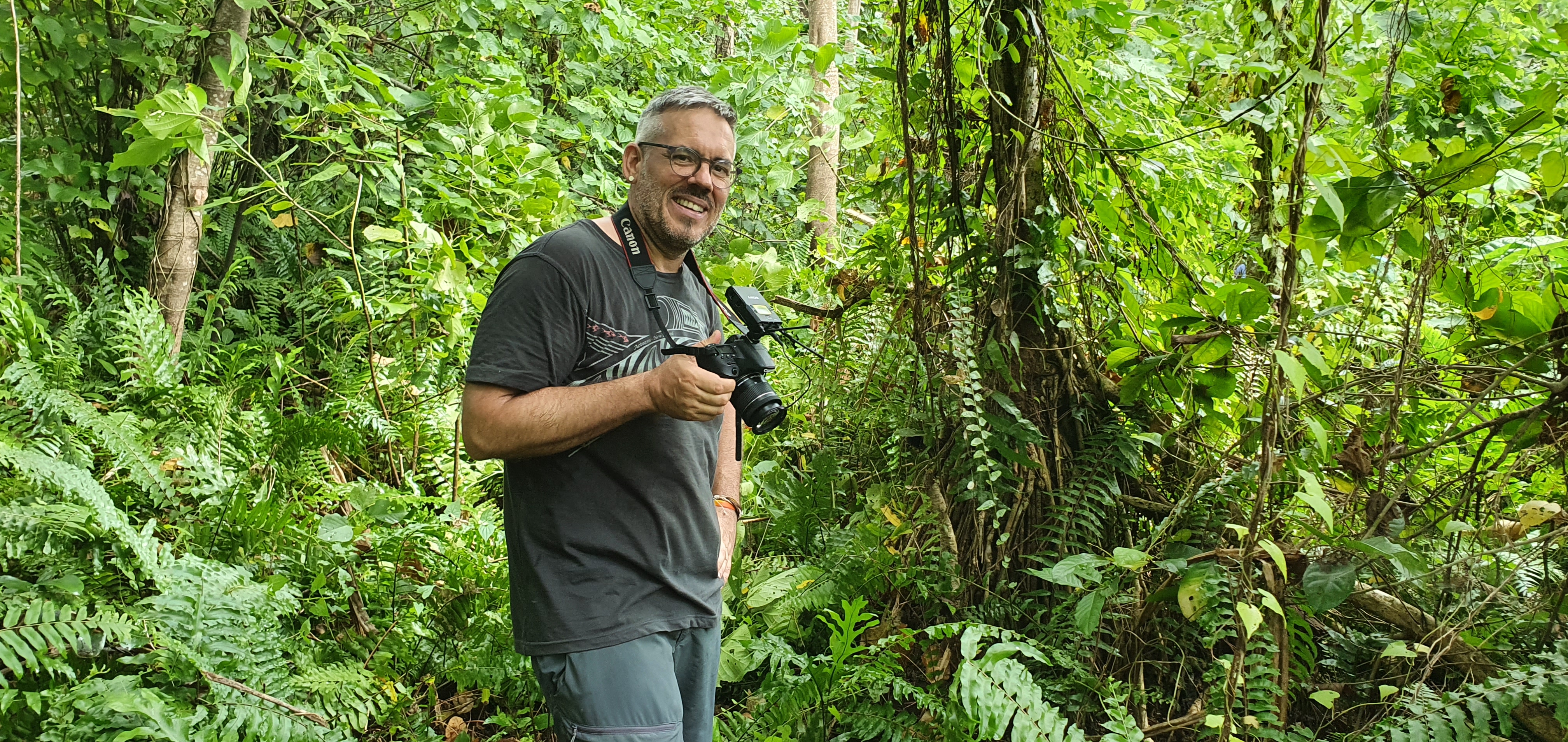Field Notes: Documenting Land Registration and Boundary Demarcation in Bellona
April 12, 2024

Detail of the GPS devise utilized by the Ministry of Land´s officer to record coordinates.
In the heart of the Solomon Islands, amidst the azure waters of the Pacific Ocean and lush greenery within the islands, lies the captivating Bellona, one of the most remotes islands of the country and one of the two atolls forming Renbel, the only Polynesian province in predominantly Melanesian Solomon Islands. Locals know it by the name of Mugniki in their Polynesian language. This is a place still governed by personal interactions, with no phone or internet coverage and where storytelling or tengatepua still govern the gatherings of locals in public spaces.
This is my second trip to the island where I am having the chance to follow the activities of UNDP’s ‘Bridging traditional governance and the rule of law through youths’ participation as agents of peace and change in Rennell and Bellona’ project, funded by the UN Peacebuilding Fund. I work as a communication officer for the project and having the chance to document these activities has been varied and challenging. The former, more than the latter.
Seven out of 10 Solomon Islanders are under the age of 30 - and 80 percent of the population live in rural areas. These are just two facts that show a lot about the county's youth and their role in peace and nation-building, in a country of very scattered geography of 992 islands, where service delivery in many is scarce or almost non-existent. Bellona is a good example of one of these, with a subsistence economy and minimal service delivery from government.
But still, people here have a very strong sense of belonging that takes special significance on their attachment to land, as if it is the only asset they truly possess. This possession is received through customary permanence. Their ancestors lived here, and every generation has continued occupying plots of land which by customary use has become theirs. Despite the difficulties people endure living here, it´s their land and they are proud of it.
In 2022, focusing on bridging the gap between traditional governance and the statutory system, the United Nations Development Programme (UNDP), in partnership with World Vision and Development Services Exchange (DSE), started this project. One of the main objectives of the project was to record customary land and present the bylaw development processes. It´s a component implemented by the Ministry of Lands, Housing and Survey. Another objective is to empower tamatama (youth) as agents of change, recognizing their traditional role in conflict resolution and involving them in finding innovative solutions for sustainable land management.
The project has made significant strides in its journey. After having previously presented a common understanding and agreement on general principles, guidelines, and standards for making the customary land recording available and accessible for inclusive and sustainable development, the project received five applications from landowners in Bellona expressing interest in having their land recorded. During this mission, the project is at the stage of recording and demarcating the land by walking the boundaries and getting neighbours agreement. To do so, I join two officers of the Ministry of Lands, Housing and Survey: A Recording Officer and a Surveyor. My mission is to document the process through photo and video.
Since it is such a sensitive issue, challenges arise. After the interest of landowners were received by the Ministry, there was a period of 90 days when applications were announced in public boards located at places like the local airport or the clinic informing of the plans for those lands to be registered and in case there were any potential disputes or discrepancies.
Even though at this stage, the deadline had expired, some members of the community are still having discrepancies, and they oppose for the land to be registered, and therefore slowing the process. It is not for me to comment on their claims and their legitimacy, that is something that the Ministry will need to investigate. However, with the discrepancies I realized the importance of this project and the relevance it has toward the future development of any activity within these lands. Land disputes are common, especially in Solomon Islands, and an eventual reason for causing problems within the community, one the main risks the project is trying to mitigate.
Other minor challenges seen was a landowner refusing for his process to be documented, which should be respected. As a communications officer, I am professionally obliged to ask for consent and equally obliged to respect the refusal.
A cultural constraint was due to a funeral happening during my time on the island. The loss of someone from the community is highly respected in Polynesian culture and observed with a strict mourning period during which all activities on the island, including school, religious services or ceremonies are cancelled until burial rites are concluded.
Amidst challenges, I also had valuable lessons to take away as I experienced the generous hospitality of Bellonese people and I was lucky enough to witness the way they greet each other with the traditional songi approaching their noses. During this mission, I was even offered a case for my mobile phone handcrafted in traditional Bellonese style, a pretty and unique style highly valued around the country for bags and tapestry.

The author during the audiovisual documentation of the demarcation process.
In spite of the challenges, I am glad about the documentation captured during the mission. It will be transformed into impactful communication products showcasing the importance of the project with features like this blog post, some social media updates and a photo gallery that will shed light on the process, while footage will be edited into a compelling video unveiling the captivating tale of how traditional governance engages with empowered youth in Rennell and Bellona to create a more inclusive and peaceful space.
I believe this journey was eye opening for me and I hope that through sharing my experience it will inspire others, especially islanders from Renbel province and Solomon Islands as they navigate the path towards sustainable peace and inclusive development.
Daniel C. Gonzalez is a Communications Analyst with UNDP Solomon Islands.

 Locations
Locations





